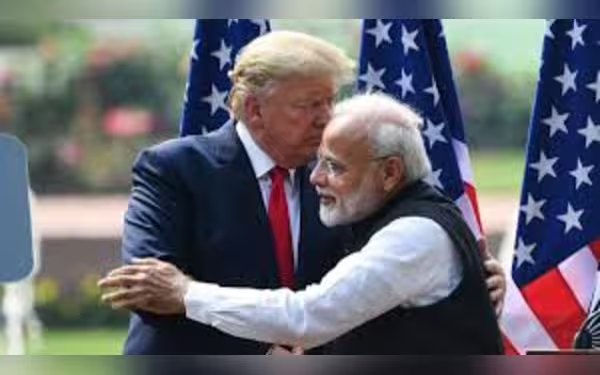Saturday, November 16, 2024 07:53 PM
Trump's Potential Presidency and Its Impact on U.S.-India Relations
- Trump's trade policies may strain U.S.-India ties.
- Illegal immigration could create diplomatic tensions.
- India's tech industry faces uncertainty under Trump.
 Image Credits: thefrontierpost
Image Credits: thefrontierpostTrump's potential return to presidency raises concerns over U.S.-India relations, trade policies, and illegal immigration issues.
As the political landscape in the United States shifts with Donald Trump potentially returning to the presidency, the implications for international relations, particularly with India, are becoming a focal point of discussion. Trump’s previous term was marked by a mix of camaraderie and tension with Indian Prime Minister Narendra Modi, and analysts are now speculating how this relationship will evolve amidst looming trade disputes.
During his first term, Trump and Modi often exchanged warm gestures, referring to each other as friends. However, Trump's approach to trade was anything but friendly. He labeled India as a "tariff king" and a "trade abuser," indicating a willingness to impose tariffs on countries with trade surpluses with the United States. This stance raises concerns for India, which has a significant trade surplus of over $30 billion with the U.S. in the 2023-24 financial year.
Experts like Indrani Bagchi from the Ananta Aspen Centre highlight that Trump’s America-first agenda aims to bring manufacturing back to the U.S. This shift could have serious repercussions for countries like India, which have benefited from outsourcing and trade. The question arises: what will happen to India’s burgeoning tech industry, which has thrived on providing services to American companies?
India has been proactive in promoting local manufacturing through initiatives like "Make in India," which has attracted major companies like Apple to diversify their supply chains away from China. However, if Trump reignites his aggressive trade policies, these advancements could be jeopardized. Ashok Malik from The Asia Group warns that while Trump’s primary focus may be on China, India will not be spared from the fallout.
Both leaders share a populist rhetoric and have garnered strong support from their respective right-wing bases. Their mutual admiration was on full display during a massive rally in Houston in 2019, where they celebrated their partnership in front of tens of thousands of Indian-Americans. Modi reciprocated by hosting Trump at a rally in Gujarat, further solidifying their bond.
However, the future of this relationship is fraught with challenges. The issue of illegal immigration is particularly sensitive, as many Indians have entered the U.S. illegally in recent years. Trump’s commitment to cracking down on illegal immigration could lead to significant diplomatic tensions, especially if mass deportations occur.
Despite these challenges, India has been strengthening its ties with the U.S. in various sectors, including defense and technology. The country is also a key member of the Quad alliance, which aims to counter China’s influence in the Asia-Pacific region. Yet, Trump’s unpredictable nature raises questions about the sustainability of this cooperation.
While the personal rapport between Trump and Modi may offer some advantages, the broader implications of Trump’s policies could lead to significant strains in U.S.-India relations. As both nations navigate this complex landscape, it will be crucial for leaders to prioritize dialogue and cooperation to mitigate potential conflicts. The coming years will undoubtedly test the resilience of their partnership, and the world will be watching closely.













